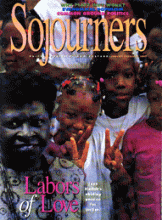Wesley Woods is a United Methodist retirement high-rise in my Atlanta neighborhood. For a long time, my deepest appreciation of it was related to the grounds that surround it: It's a safe and interesting place to walk my dog. Savannah likes to chase the squirrels, wade in the stream, and arrive around 7 o'clock in the evening. That's when the self-described "bread and peanut lady" comes outside to feed the wild creatures. My typically exuberant and affectionate golden retriever is enamored of her (mostly because she would feed Savannah an entire loaf of white bread every evening if I let her).
Some mornings I catch the Emory University shuttle at Wesley Woods and ride it to my classes at the seminary. A few weeks ago, while I was waiting, I met a woman whose husband had been a pastor in the area where I grew up before he retired several years ago. In the middle of Atlanta, we shared a string of nostalgic reflections about the First United Methodist Church on Chocolate Avenue in Hershey, Pennsylvania.
I've come to appreciate the rich texture of the older lives that exist behind the walls. I find I'm always learning something new. But no one took me more by surprise than Frances Pauley, whose 91st birthday party I recently attended.
BACK IN 1961, Frances was involved in the campaign to desegregate Albany, Georgia. She was arrested, put in jail, then released and told by the police to get out of town. She confronted her fear by marching right into the office of the chief of police, Laurie Pritchett. "Chief," she said, "they asked me to leave town, but I've got a few things I haven't quite finished yet. So I thought I'd tell you I'm gonna be here a few more days. If there's anything I can do to help you, please let me know." His mouth was still hanging open when she turned around and marched out.
Read the Full Article
